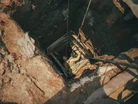Critical Minerals Driving China's Growing Africa Investments

Chinese investment in Africa is on the rise again, after a slump during the Covid-19 pandemic – with critical minerals one of its key points of focus.
Reuters reports that China is committing billions of dollars to new construction projects and trade, with fresh Chinese investment in Africa increasing 114% last year, according to the Griffith Asia Institute at Australia’s Griffith University.
Much of this investment has been in infrastructure around minerals essential to the global energy transition and China’s plans to revive its own flagging economy.
Data from the American Enterprise Institute, a Washington-based think tank, showed investments hitting nearly $11 billion in 2023, the highest level since it began tracking Chinese economic activity in Africa in 2005.
Some $7.8 billion of that went to mining, including on Botswana’s Khoemacau copper mine, which China’s MMG Ltd bought for $1.9 billion, as well as on cobalt and lithium mines in countries including Namibia, Zambia and Zimbabwe.
Critical minerals driving China's Africa investments
The hunt for critical minerals is driving infrastructure construction as well. In January, for example, Chinese companies pledged up to $7 billion in infrastructure investment under a revision of their copper and cobalt joint venture agreement with Democratic Republic of Congo.
Western and Gulf powers are also racing to lead the world’s energy transition, with the US and European governments backing the Lobito Corridor, a rail link to bring metals from Zambia and Congo to Africa’s Atlantic coast, says Reuters
This is a snapshot of China’s current interests in critical minerals operations in Africa
- Ivanhoe Mines (Canada). Chinese Stake: 39%; Minerals produced: copper, gold, zinc, platinum
- Lithium Americas (Canada). Chinese Stake: 46.7%. Minerals produced: Lithium
- Altura Mining (Australia). Chinese Stake: 19.8% Minerals produced: Lithium
- Lithium Chile (Canada). Chinese Stake: 17.7% Minerals produced: Lithium
- Avalon Advanced Materials (Canada). Chinese Stake: 19.9%. Minerals Produced: Lithium, cesium, tantalum, indium, gallium
- NexGen Energy (Canada). Chinese Stake: 19.9%. Minerals produced: Uranium
- Teck Resources (Canada). Chinese Stake: 6.7%. Minerals produced: copper, zinc, steelmaking coal
- Fortescue Metals Group (Australia). Chinese Stake: 16.8%. Minerals produced: Iron ore
Global mining powers look to secure lithium supplies
China is not alone in jockeying for position when it comes to securing supplies of critical minerals. Some countries have made significant law changes to speed this process.
The US signed into law the Inflation Reduction Act (IRA), which sets out the US’s commitment to increasing its domestic supply of critical minerals. The IRA has three main purposes: to secure the energy transition; to encourage domestic manufacturing; and to improve US energy security.
And the European Council and the European Parliament reached a provisional deal on the Critical Raw Materials Act (CRMA). The CRMA aims to ensure the EU’s access to a secure and sustainable supply of critical raw materials.
The IRA and CRMA are the clearest results of a race to reclaim control over critical raw materials following the global supply chain vulnerabilities exposed during the pandemic and exacerbated by Russia’s invasion of Ukraine, as well as a growing frustration over China’s dominance of the global critical raw materials chain.
America and the EU recognise that critical raw materials are the cornerstone for the electrification of society. This article explores the IRA’s and CRMA’s potential impacts and opportunities for the mining industry.
